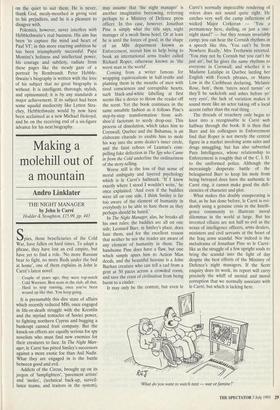Making a molehill out of a mountain
Andro Linklater
THE NIGHT MANAGER by John le Carre
Hodder & Stoughton, £15.99, pp. 443
Spies, those beneficiaries of the Cold War, have fallen on hard times. To adapt a phrase, they have lost an evil empire, but have yet to find a role. 'No more Russian bear to fight, no more Reds under the bed at home', one of them explains in John le Carre's latest novel: Couple of years ago, they were top-notch Cold Warriors. Best seats in the club, all that. Hard to stop running, once you've been wound up like that. You keep going.
It is presumably this dire state of affairs which recently reduced MI6, once engaged in life-or-death struggle with the Kremlin and the myriad tentacles of Soviet power, to fighting northern Cyprus and bugging a bankrupt canned fruit company. But the knock-on effects are equally serious for spy novelists who must find new enemies for their creatures to face. In The Night Man- ager, le Cane has pitted Smiley's successors against a more exotic foe than Asil Nadir. What they are engaged in is the battle between good and evil.
Addicts of the Circus, brought up on its jargon of 'lamplighters', 'pavement artists' and 'moles', (technical back-up, surveil- lance teams, and traitors in the system),
may assume that 'the night manager' is another imaginative borrowing, referring perhaps to a Ministry of Defence press officer. In this case, however, Jonathan Pine is simply what the title says, night manager of a swish Swiss hotel. Or at least he is until the forces of good, in the shape of an MI6 department known as Enforcement, recruit him to help bring to book an international arms trader called Richard Roper, otherwise known as 'the worst man in the world'.
Coming from a writer famous for wrapping equivocations in half-truths and planting them in the mouths of men with tired consciences and corruptible hearts, such black-and-white labelling at first seems like a device to throw the reader off the scent. Yet the book continues in the same unsubtle fashion as it follows Pine's step-by-step transformation from soft- shoe'd factotum to seedy drop-out. This process of dissolution, which takes him to Cornwall, Quebec and the Bahamas, is an elaborate charade to enable him to mole his way into the arms dealer's inner circle, and the faint echoes of Leamas's com- pelling fake defection in The Spy who Came in from the Cold underline the ordinariness of the story-telling.
Worse still is the loss of that sense of moral ambiguity and layered psychology which is le Carres hallmark. 'If I knew exactly where I stood I wouldn't write,' he once explained. 'And even if the baddies were all on one side, I think Smiley is far too aware of the element of humanity in everybody to be able to hate them as they perhaps should be hated.' In The Night Manager, alas, he breaks all his own rules: the baddies are all on one side; Leonard Burr, in Smiley's place, does hate them, and for the excellent reason that neither he nor the reader are aware of any element of humanity in them. The handsome Pine does have a flaw, but one which simply spurs him to Action Man deeds, and the beautiful heroine is a John Buchan creature who can tell a cad from a gent at 50 paces across a crowded room, and save the crust of civilisation from being burnt to a cinder.
It may only be the context, but even le Carre's normally impeccable rendering of voices does not sound quite right. He catches very well the camp inflections of wicked Major Corkoran — 'You a permanency here, darling, or just a one- night stand?' — but they remain invariably camp; you can hear the Cornish rhythms in a speech like this, 'You can't be from Nowhere Really,' Mrs Trethewin retorted. 'You may not be Cornish but you can't be just air', but he gives the same rhythms to everyone in Cornwall; and whether it is Madame Latulipe in Quebec larding her English with French phrases, or Mama Low in the Caribbean declaring, 'Melanie Rose, hon', them `taters need turnin' or they'll be sackcloth and ashes before yo' very eyes', the lack of variation makes it sound more like an actor taking off a local accent rather than the real thing.
The threads of treachery only begin to knot into a recognisable le Cane web halfway through the book. It is then that Burr and his colleagues in Enforcement find that Roper is not merely the central figure in a market involving arms sales and drugs smuggling, but has also subverted Pure Intelligence, whose relationship to Enforcement is roughly that of the C. I. D. to the uniformed police. Although the increasingly desperate battle of the beleaguered Burr to keep his mole from being betrayed does have the authentic le Cane ring, it cannot make good the defi- ciencies of character and plot.
What makes this doubly exasperating is that, as he has done before, le Cane is evi- dently using a genuine crisis in the Intelli- gence community to illustrate moral dilemmas in the world at large. But his invented villains are not half so evil as the nexus of intelligence officers, arms dealers, ministers and civil servants at the heart of the Iraq arms scandal. Nor indeed is the melodrama of Jonathan Pine so le Cane- like as the struggle of a few upright souls to bring the scandal into the light of day despite the best efforts of the Ministry of Defence's night managers. If the Scott enquiry does its work, its report will carry precisely the whiff of mental and moral corruption that we normally associate with le Cane, but which is lacking here.
'What do you want to watch next — war or famine?'


















































 Previous page
Previous page